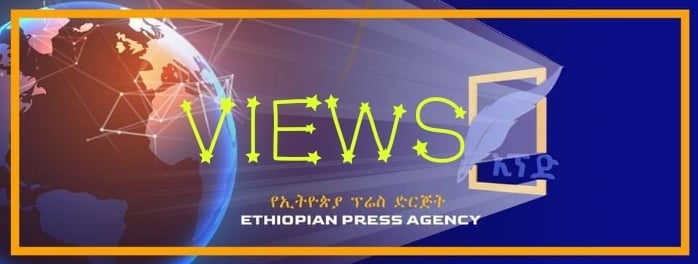
Sis’s warnings of “taking a single drop of Egyptian water -all options are open,” are being widely repeated in Egyptian and Arab media. I presume he is talking about the water collected in the Aswan Dam. In that case he has to guard it carefully. If he is talking about the whole Nile waters flowing from or through nine or more countries to reach Egypt, he is wrong. The Egyptians, including President Sisi, need to unlearn what they have learned about the Nile.
They have to relearn that Egypt is no longer the Nile and nor is the Nile Egypt. The Nile is a shared property and it would be better for Egypt to be in agreement on the framework of sharing with others. I think, their current display of fervor for military victories, pursuit for political dominance, and exhibition of insatiable greed to control whole Nile River basin is dangerous for the stability of the three countries (Egypt, Ethiopia and Sudan ), if not for whole of the Middle East and the rest of Africa. It is shrewd move but not a long-lasting solution.
The issue of argument is the Grand Ethiopian Renaissance Dam (GERD), which Ethiopia is building to produce hydroelectric power for its people. Ethiopian people have built this Dam on their own soil, with their own money, and, purely to get electric light and power. It is not meant to hurt either Egypt or Sudan. The Egyptian authorities refuse to understand this. They allegedly brand it as an existential threat and are working round the clock, looking for all ways and means to sabotages its completion. As far back as 2012, Egypt was looking for ways and means of bombing the dam. Since then these threats and conflicts continued.
At this point it is important to underscore, that the Egyptian leaders should recognize that, the GERD, beyond generating electricity, which Ethiopia needs badly, is a showcase for the whole of Africa. It exhibits how African countries can fund their basic development projects through raising their own local funds without borrowing from international financial institutions.
As this Dam provides mutual benefit to both Sudan and Ethiopia, it serves as a good example of Africa’s trans-boundary project for resource sharing and mutual economic development. It is in line with pan-African drive for development. I think, sooner or later, African countries will look at the actions of Egypt with contempt; though she tries to induce some of them with sham military pacts.
So one may ask, if the GERD is not really an existential problem for Egypt, then why are Egyptians so strongly opposed to its completion? The answer to this question is that the Grand Renaissance Dam sets in motion a new chapter on the ownership of the Nile waters, and its effects for the entire region could be deep. It implies that Egypt can no longer claim the sole proprietorship of the Nile. This is an emerging fact and she has to accept it. It is outlandish not to accept this and purposely hide behind outdated colonial treaties of which Ethiopia is not a partisan. Egypt should acknowledge and work towards negotiated agreement instead of threatening Ethiopia with all sorts of intimidations.
We do realize that the outcome of the dam on the entire region is deep. Built only 25kms on Ethiopia-Sudan border, the GERD,” …will produce about 6,450 megawatts of electricity, a hydropower jackpot that would boost the country’s aspirations to attain middle-income status by 2025”. That is for Ethiopia. For Sudan, on top of providing cheap electricity, it creates an enabling environment for the development of Sudanese agriculture through steady water supply that goes throughout the year.
Sudanese experts on international law and water policy openly testify that their country will benefit from the Grand Ethiopian Renaissance Dam (GERD). In February 2020, Yassir Abbas ,Water Resource Minister talked about how the GERD will make the flow of the Nile more predictable and even help Sudan to introduce a third farming season (BBC NEWs April 22/2021)
Taking into account that nearly 76 percent of all the total area of the Sudan could be developed under irrigation, one can see that Sudan has potentially a large appetite for irrigated agriculture. An Egyptian diplomat is said to have described Sudan as “… a long, dry sponge that could soak up all the water”. Sudanese professionals in the field of water technology and irrigation know that, if Sudan gets sufficient water, it (Sudan) has a comparative advantage over Egypt for sustainable production of cereals oil crops, sugarcane, pulses, vegetables and fruits.
This vast agricultural potential is attracting many investors from the rich Arab countries such as Qatar, Algeria, Morocco, UAE and even Turkey who want to extend their agricultural sector in Sudan. Many Gulf States take Sudan as ultimate destination for investment to secure their long term food security. This can further boosted through the currently improved relations with western powers and international financial institutions. As the Crisis Group Report 271 of, March 2019 frankly puts, “Sudan covets the cheap electricity and expanded agricultural production that it {GERD} promises.
Many scholars believe that what Sudan needs is sufficient water, peace and stability and an appropriate environment for investment. If Sudan gets peace and stability it can easily outstrip Egypt within a short time. So Egypt is more frightened of the potential agricultural development of Sudan which the Grand Ethiopian Renaissance Dam (GERD) would spark in the years to come. With further development of irrigated agriculture, Sudan could definitely consume significant amounts of water and thereby reduce further Egypt’s volumetric share of the Nile waters. So Sis’s warnings of taking single drop of Egyptian water, ‘all options are open’ are equally directed to Sudan.
The current leaders of Sudan do understand these warnings are equally valid to Sudan and not only to Ethiopia. To cool down this attitude the Sudanese current leaders have promised to Egypt that even after the GERD is completed, they will not tap water for agriculture so aggressively as to threaten water supply to Egypt. Egypt does not fully trust those promises. (Crisis Group Report 271, March 2019), so in this perspective Egypt sees the GERD as a dreadful project,
That is why they have come up with a shrewd politics to stop both Sudan and Ethiopia from using the GERD for the economic and social development of their peoples. The strategy is to disturb their peace and stability. Peace and stability are the circumstances that would lead to development of agriculture and industry in these countries which Egypt thought would supposedly undermine her control over the Nile.
The political environment in the Horn of Africa seemed to be favorable to this cunning plot. This is the time, according to her political strategists, to rout her two challengers for Nile waters. One of these opportunities was the recent change of Government in Sudan that brought in a more volatile political situation there. The new Sudanese Military leaders are not strong enough to stand by themselves and instead sought the support of Egypt for their survival against their own people who are emphatically demanding for political and economic reforms for which they are incapable. They are clinging to the Egyptian government for safety and to remain in power in Sudan.
They wanted to show their loyalty to the Egyptian Government by flagrantly contradicting their earlier statements about the advantages of the GERD to the economic development of Sudan. After shifting sides, the same Abbas told journalists that the GERD is really a threat to the people downstream… both the environment and the livelihoods of the people. As this was so weak an argument to convince the Sudanese people to go to war with Ethiopia, the Egyptian Government emboldened the Sudanese military leaders to take aggressive actions against Ethiopia contrary to true interest of the people of Sudan. Without any notice, Sudan occupied an Ethiopian territory on Ethiopia -Sudan border, called Fashaga. This was unusual. Though there were claims on both sides of the Fashaga area, until now, the Sudanese never dared to occupy that area militarily.
At time of the Fashaga occupation by the Sudanese forces, Ethiopian forces were busily embroiled in keeping law and order in Tigray Region and in a few parts of the country. Immediately, following this, Egypt brought in its armed force into Sudan and started joint military exercise. On Nov. 14, 2020 Sudanese air force units and Egyptian commando teams conducted a joint Egyptian-Sudanese air drill, the first of its kind (Arab News).
They also agreed to carry out more drills for all armed forces branches, and step up cooperation in training, border security. An Egyptian military official pompously described the new phenomenon by saying “It is natural for Egypt to back Sudan’s right to defend its territory against any assault given the deeply rooted relations between the two countries.” (Al monitor/2020/12). Sudan joined the unholy alliance and together they began chanting war songs against Ethiopia.
When the Ethiopian Government down played the occupation of Fashaga as an issue to be handled through discussions by the two neighboring countries and refused to retaliate to even further occupation of the border towns, the Egyptians began to be restive. Their plot to set the two countries to perpetual war seemed to be down for the count. Particularly as the Egyptians are impatient as the popular opposition is fomenting in different parts of Sudan and the rainy season in which Ethiopia has announced to fill the Dam reservoirs is fast approaching. Somehow it has to sabotage the second filling of the Dam, unless Ethiopia signs a forced a legally binding agreement on the filling and operation of the dam
Currently, they are further heartening Sudanese generals to go farther and occupy the whole Benishangul Region of Ethiopia to bring Ethiopia into an all-out war with Sudan. Now the joint forces of Sudan and Egypt are on the alert waiting orders to occupy Western Ethiopia. On the diplomatic front they are encouraging Sudanese officials to tell the world governments the reverse of what they had told them a year ago. Before going to the Egyptian side Sudanese had told to Arabs, Africans, and western world that GERD has comprehensive advantages to Sudan’s agricultural development.
Now, the foreign Minister of Sudan went to different African and Asian countries to tell the new Egyptian version of the GERD. No wonder some countries did not take the Sudanese foreign Minister seriously. The Egyptians put Sudan to shame before world governments for Sudan’s pendulous approach to the issue of the GERD. That is the first defeat that Sudanese leaders have to swallow for sheepishly following Egypt.
It is clear to all of Africa and the world that all this military pacts and diplomatic maneuvers, are meant to incite war between their joint forces and Ethiopia. But on the day when Ethiopian Government says enough is enough the war could begin. Then the battle grounds will be in Sudan and Ethiopia and spillover to Egypt. The towns to be destroyed will be that of Sudan and Ethiopia. The dams that will be damaged will be that of Sudan and Ethiopia. The people that will be killed, wounded and displaced will be Sudanese and Ethiopians but not Egyptians. What would Sudan gain from this war? Why are the Sudanese leaders pushing themselves and their people into a senseless war with Ethiopia when they have no convincing reason for it? Just to stay in power for a few years?
The Sudanese Generals should realize that Ethiopians are never patient with any outside encroachment of their country. In 1977, Ethiopia and Somalia fought a harsh war on the disputed region of the Ogden. In 1998, Ethiopia fought a bitter war with Eritrea over a small piece of contested land called Badme. In both cases Ethiopia was victorious. I am quoting only the most recent history. The Egyptians can tell you what had happened to their forefathers in the last century when they tried to use the military option.
I wonder if the Sudanese people and Government realize that they are being pushed into a perpetual war in opposition to their own self interest. Even though, you fight Ethiopia together today it is your turn tomorrow the weakening and destruction of the Sudan republic is the final goal of the Egyptian intrigues. This is an admonition to the Sudanese people to be aware of these Egyptian intrigues. They should resist the push to go to war with Ethiopia. On our side we have for long resisted all the provocations.
As Prime Minister Ably Ahmed said “Those fanning discord clearly do not understand the strength of our historical ties,” As an Ethiopian citizen I am expecting that the Sudanese leaders will also realize the historical and cultural relations of our peoples and work together for their wellbeing. Al Sisi’s warning on a single drop of Egyptian water is a warning more to Sudan than to Ethiopia. It is double-glazing
BY AMARE BEDADA
The Ethiopian Herald June 5/2021




